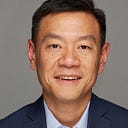Learning to Invest in Yourself
Invest in as much of yourself as you can.
You are your own biggest asset by far.
– Warren Buffett
Some years ago, I was working in a job at a university medical school. The job was good, and the people were good, but the pay was less than desirable. I made a conscious decision years earlier to leave a corporate job and go into academia, taking a large pay cut in the process. Because the pay cut was a self-initiated decision, I just lived with it, thinking all along that I didn’t care about money.
Compensation That Reflects Your Value
In July 2015, I signed up for a self-development workshop in Toronto. In that workshop, the facilitator offered a different view on money. He said, “Use the money you make as an indicator of how much value you are putting out into the world.” I had a stark realization then that my not caring about money was detrimental to maximizing the value that I’m putting out to the world.
The week following that workshop, I vowed to become a much better contributor to others. And I vowed to double my salary as a realization of that contribution. A few months later, an opportunity serendipitously emerged at the University of Utah. The role called upon me to contribute more than I had at the time, and the salary was exactly double.
I think about the cost of that workshop in Toronto — $1,200 — and the benefit I received in return. I wondered, “Why don’t I do this every year?”
Since that workshop, I decided to go through a significant training program every year. In 2017, I went to a retreat which inspired me to write my first book. In 2019, I went on a personal spiritual retreat to Peru. Each experience challenged me to grow. I’m very grateful for the opportunity to learn and develop.
It’s said that every dollar that you spend on yourself yields you about $30 in benefits. I have seen the truth of that statement in my own experience. The return is in monetary form and also in the form of efficiency and life satisfaction. One of my current roles is to teach workshops. In my time management workshop, I tell learners that investing one hour in the workshop is likely to save them at least 100 hours on projects that they should say “no” to. That’s a pretty good return for one hour.
How much are you investing in yourself and in your growth? Most people would happily spend $100 on dinner but would refuse to spend $100 on a workshop. What will the dinner get you compared to the benefits of that workshop? I’ve come to understand that investing in oneself is the best form of investment.
Leaders Are Readers
One way to invest in yourself and your learning is through reading. A well-written book represents an abundance of life experience, learned by someone else, who took the time to summarize so that you can benefit from that experience in a few hours. If you were to learn that experience yourself, it would take you a much longer time.
Let’s say you need to have a difficult conversation with someone soon. Reading a book about having hard conversations puts you in a much better position to have one. This is true for anything that you want to become better at.
Life Agenda-Learning-Reading
How many non-fiction books have you read this year to increase your knowledge? The number is quite low for most people. Surprisingly, many leaders and executives — people who we associate with having the least amount of time to read — read much more than the average person.
Why are people unwilling to spend $100 for a workshop? Is it because they don’t have enough money? Why do people not read to learn? Is it because they don’t have time? No, the counter-intuitive reality is that to deal more effectively with outer situations, you must work on yourself.
There’s a saying by Jim Rohn that I often remind myself of when dealing with challenging situations: “If you will change, everything will change for you.” Think about what you want to improve in yourself and develop a reading list around that topic.
To deny education to any people is one of the greatest crimes against human nature. It is to deny them the means of freedom and the rightful pursuit of happiness, and to defeat the very end of their being.
– Frederick Douglass
The Pursuit of Happiness
Think about something that you are very good at doing. You’ve spent a lot of time developing the knowledge and skill associated with becoming good at that craft. How might you continue to develop yourself incrementally toward a world-class level of expertise in that area?
What do you want to be the expert/master at? As you consider this question, you will take responsibility for your growth and development. As you continue your journey, you continue to develop mastery in something that is meaningful to you. This is a long pursuit of true happiness.
